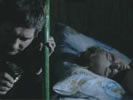Eye For Film >> Movies >> Four Nights With Anna (2008) Film Review
Sometimes silence in a film can kill it stone dead, with recent cinematic demises on the altar of no dialogue including Bullet In The Head and In The City Of Sylvia. But it doesn’t have to be that way. In the right hands, silence becomes a stealthy character in itself, lurking in each scene, stirring up tensions without saying a word. Blissfully, this is the case with Jerzy Skolimoski’s first trip behind the camera for more than 15 years. His return to direction, like the slow build up of his film, is worth the wait.
We, like the silence, slip into the life of Leon (Artur Steranko), a man for whom the term ‘sad sack’ could have been invented. His drab clothes speak of having been slept in for weeks and yet when we look in his eyes its clear he hasn’t had a good night’s kip in months. We quickly think we know all about Leon, his dreary existence as a hospital janitor under threat, his cowed drudgery caring for his grandmother. But Skolimowski raises questions with a shifting timeline. One moment we’re at the scene of a sexual attack – is it past, present or still to come? And what is/was/will be Leon’s role in it? As a policeman shouts in scenes that break up the much of the action: “Do you even have a memory?”

Leon’s grip of reality past may be in doubt, but he certainly has a plan in the present. His one chink of light is Anna (Kinga Preis), a nurse who lives over the road. He is completely obsessed with her, but again, the shifting sands of Skolimowski’s narrative make it hard for us to ascertain whether the root of his compulsion to watch her lies in a previous act or an aspiration he has now. When a batch of sleeping pills come into his possession, the way is clear for him to drug her – but rather than the film taking us off down the expected thriller route, a bizarre and disturbing courtship begins.
Nothing is certain in Skolimowski’s film. Although initially giving the impression that Leon may well be armed and extremely dangerous, we are soon invited to empathise with his predicament. Plus, since we see everything from Leon’s perspective, we only come to understand Anna’s motivations piecemeal – but even these revelations hold the unexpected.
Everything has a slightly otherworldy edge, thanks in no small part to surreal intercut segments involving a dead cow, and like the rain-sodden landscape, the entire film is drenched in melancholy. Skolimowski also draws on the comedy of the absurd humour once favoured by Kafka and Beckett to confound his audience with moments of deeply black physical humour that bring Leon’s frailties sharply into focus.
Although the direction is slick and the music by Michal Lorenc a real mood-builder, it is hard to find enough praise for Steranko. Since the film is almost entirely shot from Leon’s viewpoint, his ability to be both disquieting, yet, strangely sympathetic is essential. Shyness has rarely had such a threatening undercurrent.
At once an exploration of delusion and the tricks of memory, the borderline between voyeurism and something more sinister, a scathing attack on authority figures and a call to consider the fine line between love and obsession, Skolimowski’s film is also an invitation to us to examine how quickly we form conclusions and how, in doing so, we can jump the wrong way to such an extent that retracing our steps may be impossible.
Reviewed on: 09 Feb 2009If you like this, try:
Dekalog: The Ten Commandments - Parts 1 - 5 and Parts 6 - 10Peeping Tom
The Piano Teacher

















